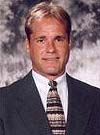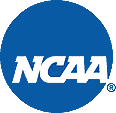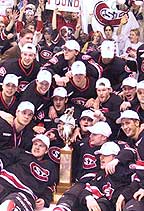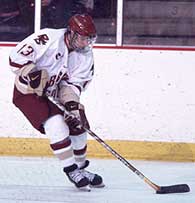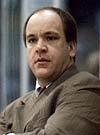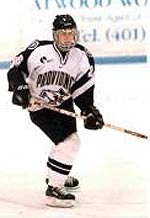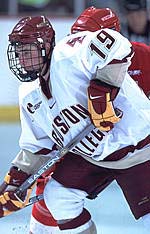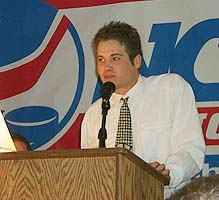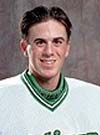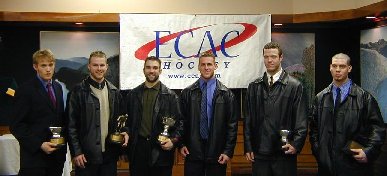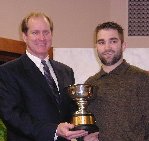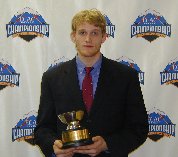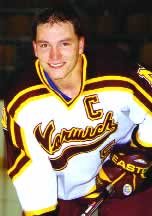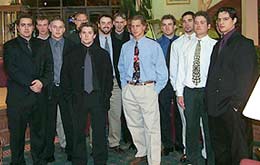Last year, we at USCHO.com tried using our own Pairwise Rankings and knowledge of the NCAA selection process to determine in advance the teams and seeds for the NCAA Tournament. We were pretty close, getting all 12 teams correct, and getting 10 of the 12 seeds right.
So with confidence in hand, we try again. This year’s regionals are being held in Worcester, Mass., on March 23-24, and in Grand Rapids, Mich., on March 24-25. This year’s Frozen Four is in Albany, N.Y., on April 5 and 7.
There were some momentous changes last off-season, all of which affect the way the tournament field is selected.
First: the addition of an automatic berth given to the Metro Atlantic Athletic Conference.
The MAAC has had quite an impact on the college hockey world, despite being just three years old.
The conference features many programs that have recently elevated their games to the Division I level, like American International, Bentley, or Mercyhurst, all of which were at the Division II level just a few years ago. These programs are now classified Division I.
This is not a new concept in college hockey; many successful Division I programs are located at lower division schools, like Colorado College (Division III) or Lake Superior State (Division II), among others. Division II hockey was drying up, and these programs quickly found themselves with nowhere to go.
In addition, the MAAC has many schools that feature Division I hockey, but, until recently, chose to play in a Division III conference and to compete at the Division III level. Primarily, this was an economic move, since trying to compete fully in Division I ice hockey can be an expensive venture. Schools like Connecticut or Holy Cross were wary of sinking scholarship money into a program that didn’t have a lot of popular support, particularly in these days of Title IX legislation.
Hence, the MAAC was born, jointly as a haven for Division II schools with nowhere else to go, and as a cost-containment venture by distaff Division I programs. The Division II schools elevated their programs, and suddenly there was a new conference full of Division I teams.
According to NCAA regulations, if a conference is made of Division I programs and follows a few rules, that conference earns an automatic bid to the NCAA tournament, regardless of how good or bad those schools may be. This is familiar in basketball, as it is commonplace for a school to win its conference tournament and earn a berth in the NCAA tournament, to serve as cannon fodder for the teams that earn the at-large bids.
The difference is that basketball has 64 slots in the postseason tournament, while hockey only has 12. Many hockey fans believe giving a bid to a clearly inferior team is robbing a deserving team of its rightful slot. But the NCAA doesn’t use terms like “robbing” or “rightful” — at the NCAA level, it’s all about providing the maximum number of playoff opportunities to deserving student-athletes.
The MAAC follwed the necessary rules and regulations to show the NCAA that it was making more opportunities available for student-athletes to play varsity hockey, and so was rewarded with an automatic bid to the postseason tournament. That bid goes into effect this year, and so, for the first time, the MAAC postseason champion, Mercyhurst, will be representing the conference on the national scale. The result is that one fewer at-large berth is available.
Second: the elimination of an automatic bid for the regular-season conference champions.
The repeal of the so-called “Colorado College rule” seemed as though it would make no difference on the college hockey world. This rule is nicknamed for the 1994 Colorado College team that earned the top spot in the WCHA regular season, then lost the opening round WCHA playoff series to blisteringly hot goaltender Jamie Ram and his Michigan Tech Huskies.
When the dust cleared, the Tigers found themselves on the outside of the NCAA tournament looking in, as the remainder of the selection criteria favored other teams. College hockey coaches banded together in the off-season to try and rectify this situation, and the result was two automatic bids for each conference, to be awarded to the regular-season champion and the conference tournament champion.
The principle effect of this rule was to add unnecessary complexity to tournament selection. For the six years following 1994, each regular-season champion would have been selected to the NCAA tournament based on the other selection criteria. In fact, it was never even close. So with the addition of the MAAC autobid, the selection committee agreed to remove the seemingly-useless additional autobid.
So what happened? The rule would have made a difference in 2001, the first year of the repeal. Clarkson entered the ECAC tournament on the bubble for NCAA consideration, and promptly lost two of three games to 10th-seeded Vermont. The two losses all but eliminated the Golden Knights, and it was only a matter of days before events in other conferences made it official. Last year, Clarkson would have received an automatic berth to the NCAA tournament; this year the Golden Knights are playing golf.
Third: byes now awarded irrespective of geographic region.
With 12 teams earning berths to the NCAA tournament, there were necessarily four first-round byes awarded. In past years, the top two teams in the West would get two of the bids, with the other two going to the top two teams in the East.
It was determined that this rule was occasionally forcing early matchups between better teams, and in order to make sure the best four teams made it to the Frozen Four, it was decided that the byes would now be awarded to the best four teams, period, regardless of where the teams might originate. Sure, in any given year, there might be an inequality in the number of teams in, say, the West, but in the long run, it should come out roughly even.
Already, the effect of this rule will be felt in the East. As the Western teams enjoyed a strong year, three of the four byes will be awarded to the West, when it would have been evenly split in years past. So the second-highest rated East team, in this case Maine, would have earned the second Eastern bye, but now will merely claim an at-large berth in the first round.
These three rules changes have altered the landscape of the selection, in both obvious and subtle ways. The obvious ways are outlined above, with Mercyhurst earning a bid and Clarkson being excluded, and Maine not being awarded a first-round bye.
But a more subtle change is also present. With the new method of awarding the byes, the NCAA Ice Hockey Selection Committee has distanced itself from the regionaliztion of college hockey. In years past the teams would have been split up into “Western” and “Eastern” teams, and then awarded byes and berths and otherwise put into brackets.
Now it is possible to rank the teams 1-12, regardless of region, and then be more flexible when trying to acheive other ends, like avoiding first-round conference matchups and maximizing potential box office draw.
When questioned about this, NCAA Director of Championships Tom Jacobs hedged his bets.
“The selection committee is leaving itself some flexibilty in deciding the teams,” he said. “There hasn’t been any decision yet if they will order the teams by region or not. They will have to see how the comparisons turn out before any decision is reached.”
These comparisons are what the selection committee uses to decide on the teams that will be invited to the NCAA tournament. USCHO.com’s Pairwise Rankings mimic the process, and while the PWR numbers are not precisely what the committee uses, they are close enough to have correctly determined the teams for the last five years. (PWR gives a final tally of the number of comparisons won, whereas the committee doesn’t do that — using a slightly different method of making a final determination. See the PWR FAQ and Selection FAQ for more details.)
Everything is falling rather easily into place when determining the teams and the seeds for this year’s NCAA tournament.
The field is pretty much set. Automatic bids have been extended to the winner of the five conference tournaments: Mercyhurst in the MAAC, St. Cloud in the WCHA, Michigan State in the CCHA, Boston College in Hockey East, and St. Lawrence in the ECAC. All but the MAAC and the ECAC winners would have been in by other criteria, so that means the ten top teams in the PWR are included. The top ten, plus the teams that are close enough to also be considered, are:
Rk Team GP W- L- T Win% Rk RPI Rk PWR
1 Michigan State 40 32- 4- 4 0.8500 1 | 0.6334 1 | 29
2 Boston College 40 30- 8- 2 0.7750 3 | 0.6162 2 | 28
3 St. Cloud 40 31- 8- 1 0.7875 2 | 0.5952 3 | 27
4 North Dakota 43 27- 7- 9 0.7326 4 | 0.5843 5 | 26
5 Michigan 42 25-12- 5 0.6548 8 | 0.5752 6 | 25
6 Colorado College 39 26-12- 1 0.6795 6 | 0.5866 4 | 24
7 Minnesota 41 27-12- 2 0.6829 5 | 0.5713 7 | 23
8 Maine 37 19-11- 7 0.6081 14 | 0.5578 8 | 22
9 Wisconsin 39 21-14- 4 0.5897 16 | 0.5560 9 | 20
10 Providence 39 22-12- 5 0.6282 11 | 0.5532 10 | 20
11 New Hampshire 39 21-12- 6 0.6154 12 | 0.5469 11 | 19
12 Mercyhurst 34 22-10- 2 0.6765 7 | 0.5461 12 | 19
New Hampshire is significantly behind Providence. Although the Wildcats are tied with Mercyhurst, Mercyhurst has an automatic berth due to winning the MAAC tournament.
So New Hampshire is out; Providence is in.
If we award the byes to the top four teams, they go to Michigan State (No. 1 West seed), Boston College (No. 1 East seed), St. Cloud (No. 2W) and North Dakota (No. 2E).
If we continue this process, we get to the following split:
1 Michigan State (No. 1W)
2 Boston College (No. 1E)
3 St. Cloud (No. 2W)
4 North Dakota (No. 2E)
5 Michigan (No. 3W)
6 Colorado College (No. 3E)
7 Minnesota (No. 4W)
8 Maine (No. 4E)
9 Providence (No. 5W)
10 Wisconsin (No. 5E)
12 Mercyhurst (No. 6W)
14 St. Lawrence (No. 6E)
Breaking this up by regions, we have:
West
Michigan State
St. Cloud
Michigan
Minnesota
Providence
Mercyhurst
East
Boston College
North Dakota
Colorado College
Maine
Wisconsin
St. Lawrence
The brackets would look like:
- Michigan State vs. Minnesota/Providence
- St. Cloud vs. Michigan/Mercyhurst
- Boston College vs. Maine/Wisconsin
- North Dakota vs. Colorado College/St. Lawrence
The first two look pretty reasonable, but the latter two set up some pretty likely second-round matchups between conference foes. The committee has suggested it wants to avoid that, and we can accomplish this by simply flipping two brackets:
- Michigan State vs. Minnesota/Providence
- St. Cloud vs. Michigan/Mercyhurst
- Boston College vs. Colorado College/St. Lawrence
- North Dakota vs. Maine/Wisconsin
There is still one potential second-round matchup in the last bracket, but with five WCHA teams, it’s not possible to avoid all possible matchups. This at least minimizes the likelihood, since Maine is a higher seed.
However, this is all based on the supposition that the committee will rank strictly on the comparisons and not by regions. If we follow the more traditional thinking, we get the following, after awarding the byes as outlined above:
West
Michigan State
St. Cloud
Michigan
Colorado College
Minnesota
Wisconsin
East
Boston College
North Dakota
Maine
Providence
Mercyhurst
St. Lawrence
The traditional plan would be to switch the bottom two from each region — No. 5 and No. 6 seed in the east to the west, and vice versa. But that would leave three WCHA and three Hockey East teams in the east, which would make it very difficult to avoid first- and second-round matchups.
Instead, we’ll send the lowest-seeded Hockey East team west, which is Providence. Either Mercyhurst or St. Lawrence will take the place of Providence, and of the two, St. Lawrence has the better draw, not to mention the respectability of an established conference.
So then we have, after switching and reseeding:
West
Michigan State
St. Cloud
Michigan
Colorado College
Providence
Mercyhurst
East
Boston College
North Dakota
Minnesota
Maine
Wisconsin
St. Lawrence
Now, avoiding second-round intraconference matchups leads to the brackets:
- Michigan State vs. Colorado College/Providence
- St. Cloud vs. Michigan/Mercyhurst
- Boston College vs. Minnesota/St. Lawrence
- North Dakota vs. Maine/Wisconsin
The only difference between this scenario and the one outlined above is swapping Minnesota and Colorado College. Neither should have an appreciable difference on the draw in either Worcester or Grand Rapids. I would guess Minnesota deserves the harder bracket after finishing so weakly, which would be the one with Michigan State.
My guess is the seeds will be as follows:
- No. 1W Michigan State vs. No. 4W Minnesota/No. 5W Providence
- No. 2W St. Cloud vs. No. 3W Michigan/No. 6W Mercyhurst
- No. 1E Boston College vs. No. 4E Colorado College/No. 5E St. Lawrence
- No. 2E North Dakota vs. No. 3E Maine/No. 6E Wisconsin
These arrangements have several advantages:
- Keeps the two Michigan schools in Grand Rapids
- Keeps BC, Maine and St. Lawrence in Worcester
- No first-round matchups among conference foes
- No second-round matchups unless a No. 6 seed defeats a No. 3 seed
The most likely alteration to this arrangement, I think, is a simple swap of CC and Minnesota, although I would think, for the draw, Grand Rapids and Worcester are equal as far as Colorado College is concerned.
We find out for sure when the selection show airs Sunday at 1:30 p.m. Eastern time on ESPN2.
